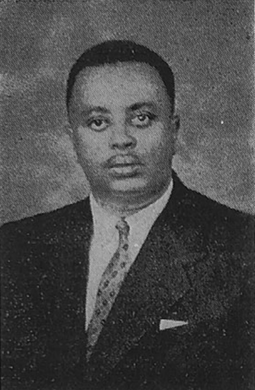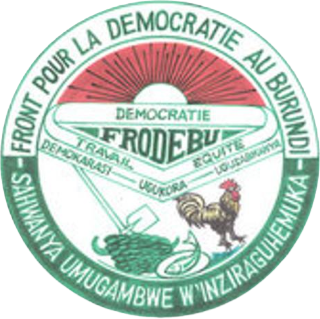Related Research Articles

Burundi originated in the 16th century as a small kingdom in the African Great Lakes region. After European contact, it was united with the Kingdom of Rwanda, becoming the colony of Ruanda-Urundi - first colonised by Germany and then by Belgium. The colony gained independence in 1962, and split once again into Rwanda and Burundi. It is one of the few countries in Africa to be a direct territorial continuation of a pre-colonial era African state.

Louis Rwagasore was a Burundian prince and politician, who served as the second prime minister of Burundi for two weeks, from 28 September 1961 until his assassination on 13 October. Born to the Ganwa family of Burundian Mwami (king) Mwambutsa IV in Belgian-administered Ruanda-Urundi in 1932, Rwagasore was educated in Burundian Catholic schools before attending university in Belgium. After he returned to Burundi in the mid-1950s he founded a series of cooperatives to economically empower native Burundians and build up his base of political support. The Belgian administration took over the venture, and as a result of the affair his national profile increased and he became a leading figure of the anti-colonial movement.

The Front for Democracy in Burundi is a political party in Burundi.

The Burundian Civil War was a civil war in Burundi lasting from 1993 to 2005. The civil war was the result of longstanding ethnic divisions between the Hutu and the Tutsi ethnic groups. The conflict began following the first multi-party elections in the country since its independence from Belgium in 1962, and is seen as formally ending with the swearing-in of President Pierre Nkurunziza in August 2005. Children were widely used by both sides in the war. The estimated death toll stands at 300,000.

The National Council for the Defense of Democracy – Forces for the Defense of Democracy is the major political party in Burundi. During the Burundian Civil War, the CNDD–FDD was the most significant rebel group active and became a major political party in Burundi. The party's rule has been described as authoritarian.

Pierre Nkurunziza was a Burundian politician who served as the ninth president of Burundi for almost 15 years from August 2005 until his death in June 2020.
Alice Nzomukunda is a Burundian politician and former Second Vice-President of the country, from 29 August 2005 to 5 September 2006. She is an ethnic Hutu and was a member of the National Council for the Defense of Democracy-Forces for the Defense of Democracy (CNDD-FDD).

The Union for Peace and Democracy–Zigamibanga, sometimes known as the Union for Peace and Development–Zigamibanga, is a small political party in Burundi which was founded in 2002 but which only became active after 2007. The UPD is one of the parties in opposition to the ruling National Council for the Defense of Democracy – Forces for the Defense of Democracy (CNDD–FDD) party. It is seen as the party of Burundi's small Muslim community.
Marina Barampama is a Burundian politician. She was elected Second Vice President on 8 September 2006, replacing Alice Nzomukunda. She remained in post for six months, until she was sacked for her support of Hussein Radjabu. Formerly a member of the National Council for the Defense of Democracy-Forces for the Defense of Democracy (CNDD–FDD), she is now General Secretary of the Union for Peace and Development.

Burundi, officially the Republic of Burundi, is a landlocked country in the Great Rift Valley at the junction between the African Great Lakes region and East Africa. It is bordered by Rwanda to the north, Tanzania to the east and southeast, and the Democratic Republic of the Congo to the west; Lake Tanganyika lies along its southwestern border. The capital cities are Gitega and Bujumbura, the latter being the country's largest city.
The Anti-corruption and Economic Malpractice Observatory, or OLUCOME, is an independent, non-governmental anti-corruption watchdog group based in Burundi. It is known to be critical of the government of Burundi and its policies.

In 2022, Freedom House rated Burundi's human rights at 14 out 100.
Burundi is a source country for children and possibly women subjected to trafficking in persons, specifically conditions of involuntary domestic servitude and forced prostitution. Children and young adults may also be coerced into forced labor on plantations or small farms in southern Burundi, or to conduct informal commerce in the streets. Child labor is very common in agricultural fields where major exports, like tea and coffee, are harvested. Forced labour of children and adults is also very common in mines due to a large market for valuable stones and ores. Many trafficking victims can be found in mines in the northern area of Burundi, especially around Cibitoke. Some traffickers may be family or acquaintances of victims who, under the pretext of assisting underprivileged children with education or with false promises of lucrative jobs, subject them to forced labor, most commonly as domestic servants. While there is little evidence of large-scale child prostitution, “benevolent” older females offer vulnerable younger girls room and board within their homes, and in some cases eventually push them into prostitution to pay for living expenses; extended family members also financially profit from the commercial sexual exploitation of young relatives residing with them. It is most common for the trafficking of victims to remain internal within the country or to extend only to the surrounding countries. Male tourists from Oman and the United Arab Emirates exploit Burundian girls in prostitution. Businessmen recruit Burundian girls for commercial sexual exploitation in Rwanda, Kenya, and Uganda, and recruit boys and girls for exploitation in various types of forced labor in Tanzania. Unlike in past years, there were no reports of forced or voluntary recruitment of children into government armed forces or rebel groups during the reporting period. If the trafficking of Burundians does extend externally, it is most common for them to be sent to locations in the Middle East and Western Europe.

Parliamentary elections were held in Burundi on 29 June 2015. The vote had been initially set for 5 June 2015, alongside local elections, but it was delayed due to unrest. Indirect elections to the Senate occurred on 24 July.

Presidential elections were held in Burundi on 21 July 2015. President Pierre Nkurunziza ran for a third term despite controversy over whether he was eligible to run again. The opposition boycotted the vote, and Nkurunziza won re-election.

On 25 April 2015, the ruling political party in Burundi, the National Council for the Defense of Democracy – Forces for the Defense of Democracy (CNDD-FDD), announced that the incumbent President of Burundi, Pierre Nkurunziza, would run for a third term in the 2015 presidential election. The announcement sparked protests by those opposed to Nkurunziza seeking a third term in office.
Hafsa Mossi was a Burundian politician, journalist, and member of President Pierre Nkurunziza's ruling CNDD–FDD political party. Mossi served as Minister of Information, Communications and Government Spokesperson from 2005 to 2007, as well as Minister of Regional Integration from 2009 to 2011, in Nkurunziza's Council of Ministers. She then served as a member of the East African Legislative Assembly (EALA), representing Burundi, from 12 June 2012, until her murder on 13 July 2016. Her current term in the EALA would have expired in 2017.
Emmanuel Niyonkuru was a Burundian politician.

On 21 October 1993, a coup was attempted in Burundi by a Tutsi–dominated army faction. The coup attempt resulted in assassination of Hutu President Melchior Ndadaye and the deaths of other officials in the constitutional line of presidential succession. François Ngeze was presented as the new President of Burundi by the army, but the coup failed under domestic and international pressure, leaving Prime Minister Sylvie Kinigi in charge of the government.

General Évariste Ndayishimiye is a Burundian politician who has served as the tenth President of Burundi since 18 June 2020. He became involved in the rebel National Council for the Defense of Democracy – Forces for the Defense of Democracy during the Burundian Civil War and rose up the ranks of its militia. At the end of the conflict, he entered the Burundian Army and held a number of political offices under the auspices of President Pierre Nkurunziza. Nkurunziza endorsed Ndayishimiye as his successor ahead of the 2020 elections which he won with a large majority.
References
- 1 2 3 4 5 "Shock at Burundi corruption death". BBC News . 2009-04-10. Retrieved 2009-04-14.
- 1 2 3 "Burundi anti-graft activist murdered: police". Reuters South Africa . 2009-04-09. Archived from the original on 2011-07-24. Retrieved 2009-04-14.
- ↑ "Burundi anti-graft team demands probe of leader's murder". Agence France Presse . 2009-04-10. Archived from the original on January 24, 2013. Retrieved 2009-04-14.